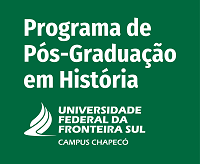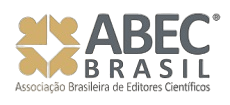About the Journal
Fronteiras: a Revista Catarinense de História foi criada em 1990 pela Associação Nacional de História - Seção Santa Catarina. Em 2018, a Revista foi incorporada ao SEER da Universidade Federal da Fronteira Sul, sob a responsabilidade do Programa de Pós-Graduação em História da UFFS. A área de concentração do PPGH / UFFS é Fronteiras, Migrações e Sociedades, temas contemplados nos textos publicados pela revista. Fronteira é o eixo estruturante, articulador e proposicional. As categorias Migrações e Sociedades são aplicadas para pensar e repensar fronteiras, sejam elas políticas, econômicas, sociais e / ou ambientais.
A revista publica artigos originais, entrevistas, traduções e resenhas na área de História, com o objetivo de divulgar os resultados da pesquisa histórica. Entrevistas e traduções, quando apresentadas, podem ser publicadas com a aceitação do Editor da Revista. Os temas dos Dossiês serão propostos pelo Editor, que convida a organização, ou por sugestão dos membros, que irão organizar o Dossiê, através de chamada online.
Os originais podem ser enviados em português e espanhol. Podem submeter artigos, entrevistas e traduções para publicação de doutorandos, mestres e doutores em História ou áreas afins; Os alunos de mestrado poderão publicar artigos, entrevistas e traduções em coautoria com o orientador, bem como submeter revisões individuais. As traduções devem vir acompanhadas de autorização do autor e do original do texto. Todos os textos recebidos para publicação serão submetidos a uma avaliação preliminar quanto à sua adequação aos objetivos acima mencionados, a ser realizada pelos Editores, coadjuvados por membros do Conselho Editorial e, quando necessário, por consultores ad hoc.
SEÇÕES
Artigo
Esta seção publica artigos originais e inéditos.
Artigos organizados em Dossiê
Esta seção publica artigos originais e inéditos sobre temas da atualidade que contribuem para o debate na História. Os dossiês consistem tanto em artigos encomendados pelos editores como em artigos recebidos em chamada aberta para submissão. Todos os artigos enviados passarão pelo processo de revisão por pares duplo-cego
Tradução
Esta seção aceita artigos originalmente publicados em outros idiomas e traduzidos para o português nas áreas de interesse da revista. As traduções devem vir acompanhadas do texto original e da permissão de tradução do artigo para republicação pelo autor e / ou editor original.
Interview
This section publishes interviews with prominent names in the journal's themes. The submitted manuscript must contain an introductory text about the interviewee.
Reports
This section publishes reports by researchers who contribute to the debate in History and dialogue with the scope of the journal.
EVALUATION PROCESS
Every submission is reviewed by the Editor-in-Chief for compliance with the journal's guidelines. If the manuscript does not meet the submission requirements, it will be returned to the author for correction and resubmission. Texts that do not meet the minimum quality and originality or that do not fit the journal's focus and scope will be rejected before even going for evaluation.
All texts approved in the preliminary assessment and which meet the minimum requirements indicated in the rules for the presentation of collaborations will be submitted to two external reviewers. If there are contrary opinions, a third party will be used. The referees must report to the editors any conflicts of interest or when they do not feel able to give the opinion. The referees are given a period of twenty calendar days, from the date of delivery of the article, for the presentation of the opinion. This deadline may be extended at the discretion of the editor, provided that it does not influence the deadline and creates delay for publication of this journal.
1. Editor's Review and Editorial Board
Every submission is reviewed by the Editor in terms of compliance with the journal's guidelines. If the manuscript does not meet the submission requirements, it will be returned to the author for correction and resubmission. Manuscripts that do not reach the minimum quality and originality or that do not fit the journal's focus and scope will be rejected by the designated editor without being sent to the referees. The Editor can consult the editorial board at all stages of the process, from the first review.
2. External evaluation
If the article is of sufficient quality for evaluation, the editor will assign the evaluation of the manuscript to two or three referees for blind peer review. Book reviews or interviews that go through the initial editorial review are typically sent to a referee. In the last four editions, the percentage of participation by reviewers outside the publishing institution was 90%.
Reviewers have four weeks to submit an assessment of the manuscript and provide recommendations for the editor to accept, reject or request changes. Evaluators are invited to provide a constructive assessment of the manuscript's strengths and weaknesses and suggestions for further improvements. If there is no agreement between the opinions, a third opinion will be provided.
3. Evaluation of the Responsible Editor
The manuscript that has been revised and resent by the author will be evaluated by the editor. The Editor will assess the overall quality of the revised manuscript and the author's ability to address issues raised by referees. The decision to accept or reject a manuscript for publication is the responsibility of the editor. The accepted manuscript will go to the review and publication stage - carried out by the journal's team.
Article rejection in 2023: 08.
Evaluation form: click here to access
FREQUENCY
The journalis published every six months, in July (January-July) and December( August-December).
From the year 2022, when N.39 da Fronteiras: Revista Catarinense de História will be published, it will be published in the months of January and August.
DEADLINE FOR PUBLICATION
The period between or receipt of the final manuscript, containing all the modifications required for oil, and publication and estimated between one or two editions, isto, between 3 to 9 months.
From or N. 32 da Fronteiras: Revista Catarinense de História , published in the second semester of 2018, a discriminatory journal not corpo do artigo published, at the date of receipt and publication of two articles.
FREE ACCESS POLICY
This journal offers immediate free access to its content, following the principle that making scientific knowledge freely available to the public provides greater worldwide democratization of knowledge.
POLICY EXEMPTION FROM CHARGES
A Fronteiras: Revista Catarinense de História does not charge a submission fee and does not charge a review fee from the authors.
COPYRIGHT
The works published in Revista Fronteiras: Revista Catarinense de História follow the license to use journals and research in all environments, commercial or not, that make up the international scientific communication system. The journal is licensed with Creative Commons Attribution 4.0 International License.
The Editorial Board authorizes free access and frank distribution of published content, provided the source is cited, that is, attributing credit to the authors and to Fronteiras: Revista Catarinense de História, and preserving the text in its entirety. The author is allowed to deposit the pre-print and post-print versions in institutional/thematic repositories or personal page (website, blog), as long as it is open access and without any embargo period.
ETHICAL CONDUCT AND GOOD PRACTICES FOR PUBLICATION
The editors of Fronteiras: Revista Catarinense de História follow the conduct indicated in the Committee on Publication Ethics (COPE). Every editorial decision is based on the originality and relevance of the submitted texts. The assessment is based on the quality of the work. Submissions and review details are kept confidential. The evaluator must be sure of a conflict of interest when reviewing the submission, when applicable. The authors of the text must be an integral part of the textual construction, which contributed to the effective elaboration of the text. Alteration or exclusion of authorship is allowed after acceptance of the manuscript.
Publishers
Every editorial decision is based on originality, proximity to the scope and compliance with editorial policies to meet the scope of the journal. Based on the standards of ethical conduct of COPE, the Editorial Commission of the Fronteiras: Revista Catarinense de História, will publish, whenever necessary, Errata, Retractions and Expressions of concern about published articles.
Authors
The indication of authorship in a scientific article is due only to those who contribute intellectually, directly and substantially in the conception of the research / article (acquisition, analysis or interpretation of the data presented); participate in the construction of preliminary versions or critical review of the article's content; and are responsible for authorship.
Authors must declare the existence of a conflict of interest when applicable. For articles originating from dissertations or theses, the author must inform at the time of submission in the notes field for the editor and, if the text is approved, this information must be included in a footnote.
Authors should promptly notify the editor of the journal if a significant error in their manuscript is identified, in addition to cooperating with the editor to publish errata, retraction or expression of concern about the document, when necessary.
Referees
The assessments are confidential, based on the merit of the work. The referees must certify and inform the editors of any potential conflict of interest prior to acceptance of the appraisal or during the process. The referees should contact the journal in case of irregularity, through the e-mail available in contact. The opinions must justify the appraiser's decision and contribute, whenever possible, to the improvement of the evaluated work.
Conflict of interests
Conflicts of interest can arise when authors, referees or editors have interests that, whether apparent or not, can influence the preparation or evaluation of manuscripts. The conflict of interest can be of a personal, commercial, political, academic or financial nature.
Editor
In turn, it is mandatory to communicate to the Editorial Board of Fronteiras: Revista Catarinense de História, in case of conflict of interest in relation to the manuscript, so that the evaluation process is monitored by the editorial board in a transparent manner.
Authors
When authors submit a manuscript, they are responsible for recognizing and revealing financial or other conflicts that may have influenced their work. Authors must recognize in the manuscript all financial support for the work and other financial or personal connections in relation to the research. The authors of the manuscript must inform mandatory whether or not there is a conflict of interest through a declaration. In manuscripts where there is a conflict of interest, this information must be included in a footnote at the beginning of the text.
Referees
They must inform the editorial staff of the journals about the presence of a conflict of interest and declare themselves not qualified to proceed with the evaluation of the manuscript.
VERIFICATION OF ORIGINALITY
All submissions received go through the identification of plagiarism and self-plagiarism, through Turnitin. If plagiarism is identified in manuscripts during the evaluation process will result in the rejection of the submitted proposal.
STATISTICS
Citation statistics
Check which are the most cited articles published in Fronteiras: Revista Catarinense de História on Google Scholar - Click here
ARCHIVING
This journal uses the LOCKSS system to create a file system distributed among participating libraries and allows them to create permanent journal files for preservation and restoration.
Financial support: UFFS and ANPUHSC.
e-ISSN: 2238-9717 | ISSN: 1415-8701 | Ano de criação: 1990 - impresso, 2009 - eletrônico


















